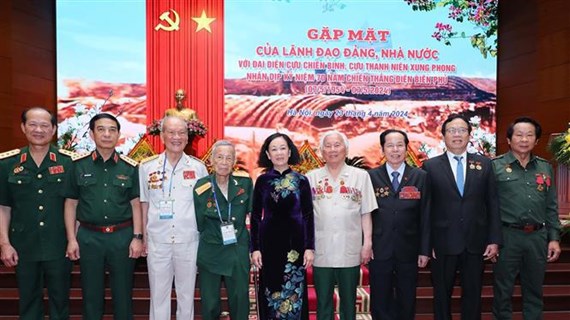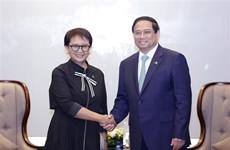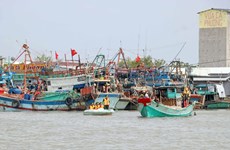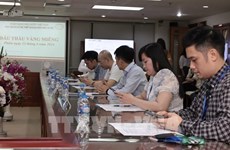Target on ODA disbursement ‘is within reach'
Vietnam is on track to fulfill its target of attracting 32-34
billion USD in Official Development Assistance (ODA) and preferential
loans during the 2011-15 period, along with capital disbursement of
14-16 billion USD.
Vietnam is on track to fulfill its target of attracting 32-34
billion USD in Official Development Assistance (ODA) and preferential
loans during the 2011-15 period, along with capital disbursement of
14-16 billion USD.
The statement was made by Deputy Minister of Planning and Investment Cao Viet Sinh, who added, " Vietnam has disbursed more than 7.8 billion USD during the past two years."
This year the country targets to disburse about 4.5 billion USD, raising the total amount of ODA disbursement during 2011-13 to 12.3 billion USD, he noted.
"It means that the country needs to disburse between 1.6-3.6 billion USD in the next two years to fulfill the target," he said.
During the past 20 years, donors' ODA commitments to Vietnam reached about 76.2 billion USD, while total ODA disbursement during the period was estimated at 36 billion USD, according to the General Statistics Office.
This year, foreign donors pledged 6.45 billion USD in ODA for Vietnam.
The European Union and its member states alone have pledged 965 million USD in ODA for Vietnam this year, said Franz Jessen, head of the Delegation of the European Union to Vietnam at a press briefing in Hanoi on June 18.
The EU had allocated development assistance to sectors where Vietnam is seeking progressive reforms to maximise synergies between Government policies and development assistance programmes, said Jessen.
"Bilateral assistance allocated to Vietnam will trigger and drive policy reform in a wide range of sectors such as the rule of law, public finance management and the health sector," he said.
To ensure the ODA target is within reach, Prime Minister Nguyen Tan Dung in April asked for comprehensive measures to attract, manage and use ODA more efficiently.
The PM asked relevant ministries, sectors and localities to cooperate with the National Steering Committee for ODA and Preferential Loans to review and assess the implementation of ODA-funded projects and programmes and have measures to promptly tackle difficulties for projects with sluggish disbursement.
However, Deputy Minister Sinh admitted that challenges remain for Vietnam in ODA disbursement, including difficulties relating to ODA-related mechanisms and policies, differences in procedures between Vietnam and donors, the lack of corresponding capital and land clearance for ODA projects.
Asian Development Bank (ADB) Country Director for Vietnam Tomoyuki Kimura said that since 1993, the ADB has approved over 100 loan-funded projects, half of which have been completed. A post-project evaluation suggested that with a 90 percent success rate, most ADB projects have been successful.
However, the ADB director said many of these projects faced significant implementation delays.
In addition, Vietnam is forecast to face more challenges as it is now a middle-income country, which means that attracting high levels of ODA will become increasingly difficult.
Sinh said some donors have changed their official development cooperation models with Vietnam to focus more on cooperation between partners while some donors may stop providing ODA for Vietnam in the coming years.
"That requires the country to have appropriate measures to attract and improve the efficient use of this capital source to meet investment development and ensure ability to pay foreign debts," he said.
Kimura said the type of ODA projects, as well as availability of the funds in Vietnam, are quickly changing.
"Concessional assistance is becoming increasingly scarce and Vietnam will eventually have to graduate from it. Therefore, it is essential for Vietnam to make sure that limited ODA funds are allocated where most value can be added and utilised efficiently," he said.
To ensure efficient use of ODA, Sinh said the ministry has worked with relevant ministries, agencies and donors to carry out a number of measures, including finalising ODA management mechanisms and policies and increasing guidance and support for project owners to deal with difficulties.
Work has also been carried out to review and assess the implementation of ODA projects to ensure timely measures to tackle the shortcomings of troublesome projects, he said.
As a donor, ADB urged the Government to better ensure project readiness and make sure that projects in the pipeline are only approved once they have achieved a high degree of total project readiness, said Kimura.
"Key to this is professional capacities of Project Management Units (PMUs), where key staff including project directors, chief accountants and procurement officers should be members of permanent units that provide staff with attractive career paths and monetary and non-monetary incentives to perform well," he said.-VNA
The statement was made by Deputy Minister of Planning and Investment Cao Viet Sinh, who added, " Vietnam has disbursed more than 7.8 billion USD during the past two years."
This year the country targets to disburse about 4.5 billion USD, raising the total amount of ODA disbursement during 2011-13 to 12.3 billion USD, he noted.
"It means that the country needs to disburse between 1.6-3.6 billion USD in the next two years to fulfill the target," he said.
During the past 20 years, donors' ODA commitments to Vietnam reached about 76.2 billion USD, while total ODA disbursement during the period was estimated at 36 billion USD, according to the General Statistics Office.
This year, foreign donors pledged 6.45 billion USD in ODA for Vietnam.
The European Union and its member states alone have pledged 965 million USD in ODA for Vietnam this year, said Franz Jessen, head of the Delegation of the European Union to Vietnam at a press briefing in Hanoi on June 18.
The EU had allocated development assistance to sectors where Vietnam is seeking progressive reforms to maximise synergies between Government policies and development assistance programmes, said Jessen.
"Bilateral assistance allocated to Vietnam will trigger and drive policy reform in a wide range of sectors such as the rule of law, public finance management and the health sector," he said.
To ensure the ODA target is within reach, Prime Minister Nguyen Tan Dung in April asked for comprehensive measures to attract, manage and use ODA more efficiently.
The PM asked relevant ministries, sectors and localities to cooperate with the National Steering Committee for ODA and Preferential Loans to review and assess the implementation of ODA-funded projects and programmes and have measures to promptly tackle difficulties for projects with sluggish disbursement.
However, Deputy Minister Sinh admitted that challenges remain for Vietnam in ODA disbursement, including difficulties relating to ODA-related mechanisms and policies, differences in procedures between Vietnam and donors, the lack of corresponding capital and land clearance for ODA projects.
Asian Development Bank (ADB) Country Director for Vietnam Tomoyuki Kimura said that since 1993, the ADB has approved over 100 loan-funded projects, half of which have been completed. A post-project evaluation suggested that with a 90 percent success rate, most ADB projects have been successful.
However, the ADB director said many of these projects faced significant implementation delays.
In addition, Vietnam is forecast to face more challenges as it is now a middle-income country, which means that attracting high levels of ODA will become increasingly difficult.
Sinh said some donors have changed their official development cooperation models with Vietnam to focus more on cooperation between partners while some donors may stop providing ODA for Vietnam in the coming years.
"That requires the country to have appropriate measures to attract and improve the efficient use of this capital source to meet investment development and ensure ability to pay foreign debts," he said.
Kimura said the type of ODA projects, as well as availability of the funds in Vietnam, are quickly changing.
"Concessional assistance is becoming increasingly scarce and Vietnam will eventually have to graduate from it. Therefore, it is essential for Vietnam to make sure that limited ODA funds are allocated where most value can be added and utilised efficiently," he said.
To ensure efficient use of ODA, Sinh said the ministry has worked with relevant ministries, agencies and donors to carry out a number of measures, including finalising ODA management mechanisms and policies and increasing guidance and support for project owners to deal with difficulties.
Work has also been carried out to review and assess the implementation of ODA projects to ensure timely measures to tackle the shortcomings of troublesome projects, he said.
As a donor, ADB urged the Government to better ensure project readiness and make sure that projects in the pipeline are only approved once they have achieved a high degree of total project readiness, said Kimura.
"Key to this is professional capacities of Project Management Units (PMUs), where key staff including project directors, chief accountants and procurement officers should be members of permanent units that provide staff with attractive career paths and monetary and non-monetary incentives to perform well," he said.-VNA












